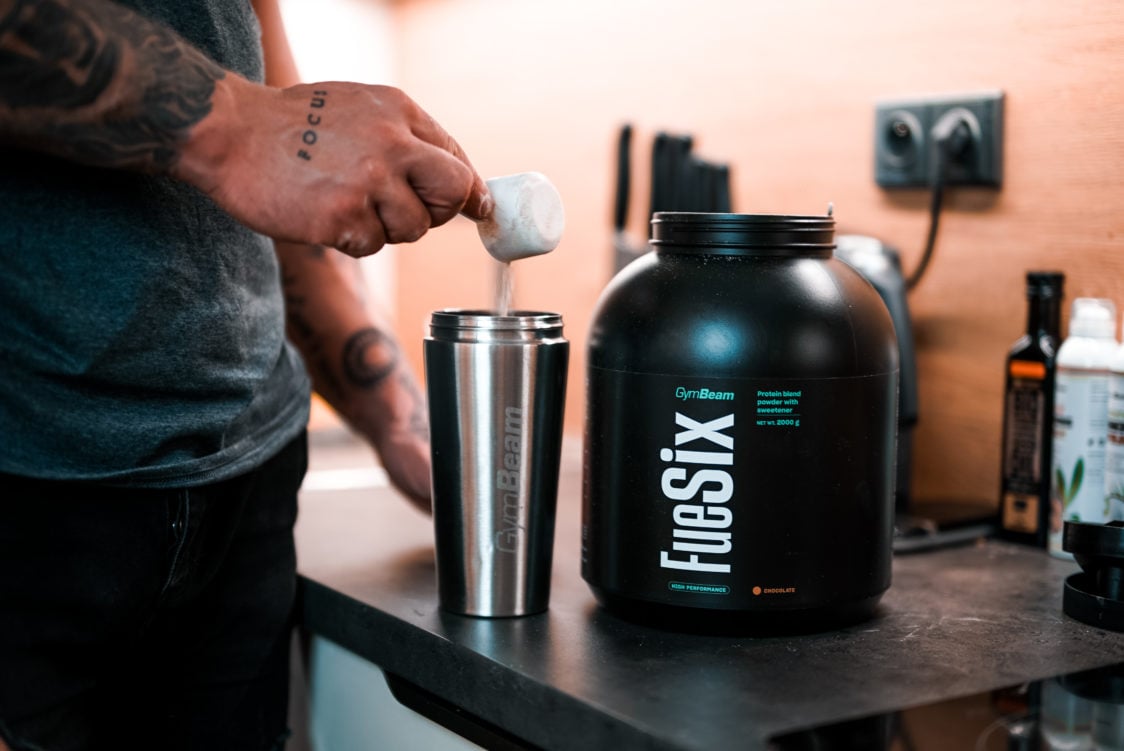Table of Contents
There are similar arguments about whether it is better to mix protein with water or milk as there are about pineapple on pizza. Each camp has its own truth that it stands by, and there are no ifs, buts or maybes. So in today’s article, we’ll take a closer look at how whey proteins behave in different drinks, and we will not disappoint in advising you whether it’s better to mix protein with milk or water.
What is protein powder and why use it?
Protein powder is a dietary supplement that belongs among the concentrated sources of protein. A person should eat approximately 0.8-2 g of protein per kilogram of BW (body weight) every day, depending on age, health and amount of physical activity. For an average 70 kg person, this is 56-140 g per day. Proteins play an important role in the body. They are essential for muscle growth and protecting muscles from being burnt for energy. In addition, they also help with reducing hunger and sweet cravings, which can support weight loss [1-4]
In today’s article, we’ll look at mixing protein with cow’s milk and water. Specifically, we’ll focus on whey proteins that are also made from milk, and so are directly encouraged to be mixed with this liquid. Whey protein has a favourable amino acid spectrum and overall ingredients profile. This is also why it is the best option among proteins for many people. If someone has decided to choose other types of proteins, such as plant-based ones, it is not typical that they would then want to mix it with cow’s milk. Nor would they be likely to try mixing it with orange flavoured collagen, for example.
If you want to learn more about the different types of proteins, you shouldn’t miss our article How to Choose the Right Protein for Weight Loss or Muscle Growth?
You might be interested in these products:
What should you mix protein powder with?
We can’t simply say that one combination of protein powder and liquid is better or worse. Each one has its own specifics, and thus is better suited for different situations. So, it’s always important to look at the context of when and why you want to have your protein shake. Equally, whether you choose to mix it with low-fat, semi-skimmed or full-fat milk will affect the final properties of the protein shake.
Let’s take a look at the properties of a protein shake with milk or water, so we can better deduce which combination you should reach for.
Differences between protein powder mixed with water or milk
Combining protein powder with milk or water produces two different drinks that have different properties. What makes them different?
1. Digestibility
Digestion is the process during which nutrients are chemically broken down in the body. Absorption then involves the passage of these substances through the intestinal wall. In terms of digestibility, the clear winner is protein with water, which your body will digest faster than it would with milk. In terms of digestion, we should mention people who are lactose intolerant and thus their body cannot digest milk sugars. For them, it is appropriate to use only whey isolate or hydrolysate and observe how the body reacts to them. At the same time, mixing protein powder with water is ideal to avoid the difficulties associated with milk. Alternatively, mixing it with plant-based or lactose-free milk may be an option. [6-7]
What to mix protein with in terms of digestibility?
- The most absorbable protein is mixed with water.
- If you have problems with lactose digestion, use only whey protein isolate or hydrolysate and mix it with water. You can replace all or part of it with plant or lactose-free milk, but the drink will take longer to digest.
- The combination of protein and milk is ideal if you are not going to eat for a prolonged period of time and do not mind that the body will take longer to digest the drink. A typical example would be drinking protein with milk before bedtime. For these occasions, for example, micellar casein, which is also often referred to as a nighttime protein, is ideal.

2. Absorption
Absorption is the process by which substances pass through the intestinal wall into the blood, where they travel to their target sites. From this point of view, the winner in terms of speed is therefore protein with water.
In the production of whey protein, the final powder is stripped of casein protein, most of the fat and possibly even lactose, which is especially true for whey isolate and hydrolysate. If you were to mix whey protein with milk, you would get these components back to a lesser extent, which would then have a negative effect on their absorption. [5]
This is not favourable especially after a workout when you want the protein to get to the muscles as quickly as possible and be able to help with the recovery of damaged muscle fibres. However, the slower absorption when mixed with milk doesn’t matter if you don’t drink protein after exercise, but anytime during the day as a snack. It is more filling thanks to the milk and you won’t get hungry so quickly. [5]
What to mix protein with in terms of absorbability?
- Protein with water is better and faster absorbed. This makes it one of the ideal post-workout drinks.
- Protein with milk is absorbed more slowly. Therefore, it is a drink that is ideal as a snack at any time of the day.
3. Taste
With taste, we can’t generally say what is better or worse. We all have different preferences, and so we all like something different. It also depends a lot on what flavour of protein you have. Personally, however, I find that protein mixed in cow’s or even plant milk tastes better than with water. But if you prefer your protein with water, go for it.
What to mix protein with in terms of taste?
- Personally, I have often come across the opinion that protein tastes better when it is mixed with milk, which I agree with.
- However, if someone is not a fan of milk drinks and prefers protein mixed with water, they can prepare the drink this way.

4. Energy value
It may not surprise you that the caloric value of protein shake varies when mixed with different liquids. If you are trying to lose weight, for example, and it is a priority for you to save as many calories as possible, then protein shake with water will be the obvious choice. However, keep in mind that the protein will also be digested and absorbed more quickly. In case you mix it with milk, your calorie intake will increase, the digestion time will be longer and you may feel fuller for longer.
If you want to learn more about the effect of protein on weight loss, you should not miss our article How Protein Changes the Woman’s Body and Helps You Lose Weight?
To give you a better idea of how the approximate calorific value and macronutrient ratio of a protein shake changes when mixed with different liquids, we have some specific examples. It will always be a case of combining 30 g of Just Whey protein with 250 ml of water or milk.
Drink | Energy values | |||
|---|---|---|---|---|
| Protein with water | 114 kcal | 22g | 2g | 2g |
| Protein with low fat milk (0,5%) | 198 kcal | 31g | 14g | 2g |
| Protein with skim milk (1.5%) | 230 kcal | 31g | 14g | 5.5g |
| Protein with full fat milk (3.5%) | 275 kcal | 31g | 14g | 10.5g |
From the above table it can be seen that protein mixed with semi-skimmed milk has 2 times more kcal compared to protein with water. In the case of protein with whole milk, the calorific value is approximately 2.5 times higher compared to protein with water. So it is up to you to consider what to include in times of a caloric deficit. But always keep in mind that the total daily intake is important. It can easily happen that even when losing weight, protein with whole milk will fit into your intake.
If you don’t know how many individual macronutrients and total calories you should eat per day to reach your goal, our online energy intake calculator will help calculate everything for you.
What to mix protein with in terms of caloric value?
- If you’re lowering your energy intake, you’ll be better off mixing your protein with water, which won’t add any extra calories.
- In case you’re trying to bulk up and are struggling to eat the right amount of food, protein with whole milk is the perfect way to easily get more calories in.

5. Consistency
Do you crave a delicious and creamy protein drink? Then protein with milk is a better choice for you. It has a higher density than water and so will help you create the desired consistency. The less milk you use, the thicker the shake will be.
A similar creamy consistency can be achieved with some proteins when mixed with water. Compared to whey protein, micellar casein can create a naturally thicker drink. However, you won’t go wrong if you choose a protein containing guar or xanthan gum, which can help create a creamy, thick consistency. Don’t worry about these ingredients, they are not dangerous. Guar gum is made from the guar beans of a plant called Cyamopsis tetragonoloba. Xanthan gum is a polysaccharide that is produced by fermentation of the bacteria Xanthomonas campestris. Both additives appear in really small amounts in the protein, so you don’t have to worry about them reducing its quality.
What to mix protein with in terms of consistency?
- Using the same amount of liquid will make a creamier protein with milk.
- Micellar casein also generally produces a creamier consistency.
- If you desire a creamy consistency, look for proteins with added guar or xanthan gum.
- The less liquid you use, the thicker and creamier the consistency will be.

What to drink protein with relative to your goal?
Goal | More appropriate combinations |
|---|---|
| Reduction in calorie intake | Protein with water |
| Increase in calorie intake | Protein with milk |
| Maximum satiation for a longer period of time (typically overnight) | Protein with milk |
| Rapid digestibility | Protein with water |
| Well digested for people with lactose intolerance | Protein (whey isolate or hydrolysate) with water or lactose-free or plant milk |
| Quick onset of recovery processes after training | Protein with water |
| Creating a tasty and creamy drink | Protein with milk |
What should you remember?
As you can see for yourself, there is no one right answer to the question whether it is better to drink protein with water or milk. Different situations call for different solutions. And likewise, different people have different needs. That’s why it’s always important to think about what your goal is and what you expect from protein in a particular instance.
It may then be more appropriate to choose a particular liquid accordingly. However, keep in mind that protein, whether with milk or water, will only make up a smaller portion of your daily caloric intake. And which fluid you use is more of a minor detail and doesn’t have that much of an impact on your overall results. So focus on making sure you have enough of the necessary protein in your diet overall, and then work on these little details.
Do you have someone in your group of friends who is afraid of mixing protein with milk? Share this article with them so that they can find out they don’t have to be afraid of this combination.
[1] Bernaciková, M., Masarykova univerzita, & Fakulta sportovních studií. – Regenerace a výživa ve sportu
[2] Ralf Jäger et al. – International Society of Sports Nutrition Position Stand: protein and exercise – https://jissn.biomedcentral.com/articles/10.1186/s12970-017-0177-8
[3] Kim J. et al. – Effects of dietary protein intake on body composition changes after weight loss in older adults: A systematic review and meta-analysis. – https://doi.org/10.1093/nutrit/nuv065
[4] Westerterp-Plantenga, M. S., Lejeune et al. – High protein intake sustains weight maintenance after body weight loss in humans. – https://doi.org/10.1038/sj.ijo.0802461
[5] WHEY PROCESSING – https://dairyprocessinghandbook.tetrapak.com/chapter/whey-processing
[6] Nissim Silanikove et al. – The Interrelationships between Lactose Intolerance and the Modern Dairy Industry: Global Perspectives in Evolutional and Historical Backgrounds – https://www.mdpi.com/2072-6643/7/9/5340/htm
[7] Rosane Rosa de Souza et al. – Recovery and purification of lactose from whey – https://www.infona.pl/resource/bwmeta1.element.elsevier-df23813c-9594-3428-8876-8341288f13dc


Add a comment